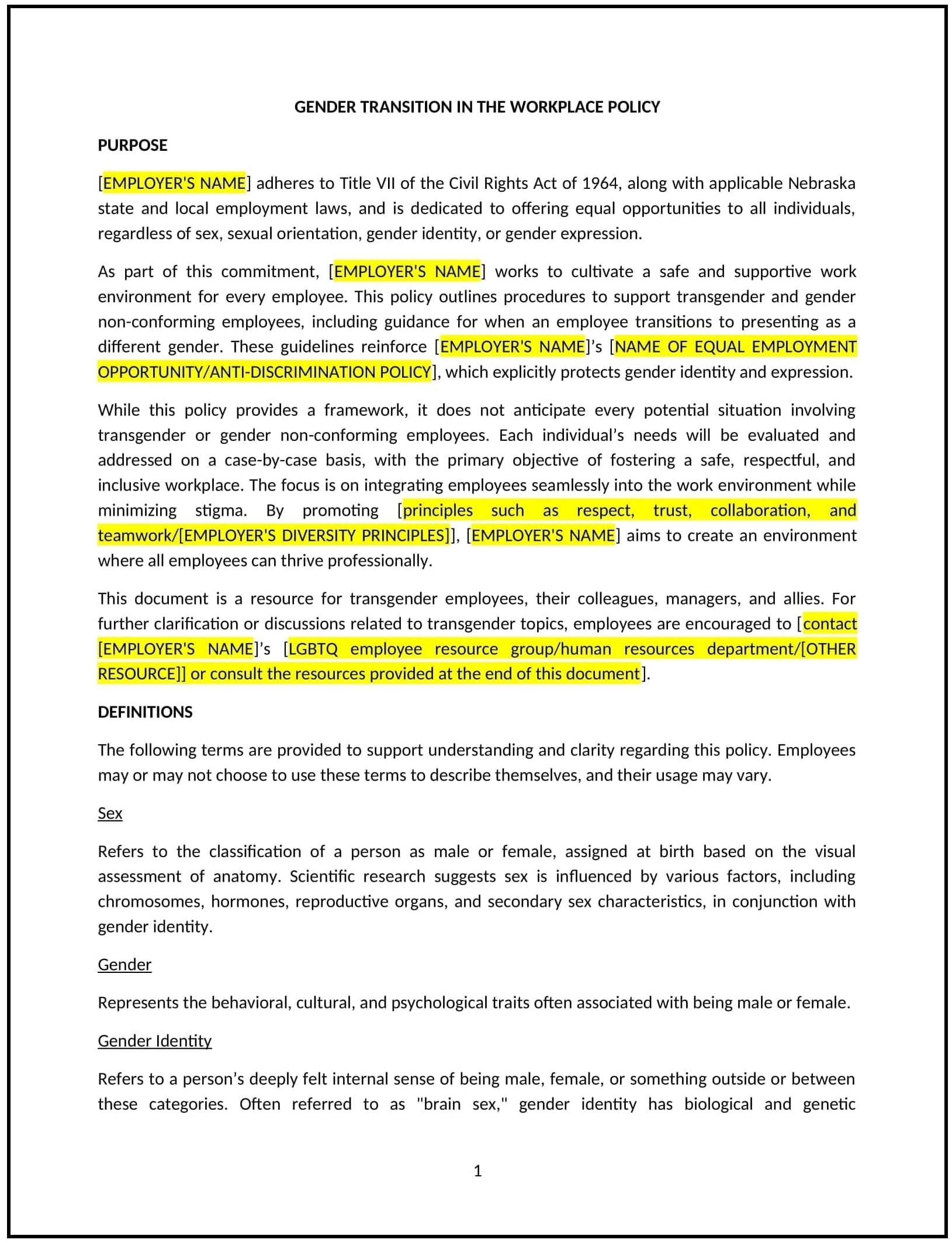Gender transition in the workplace policy (Nebraska): Free template
Got contracts to review? While you're here for policies, let Cobrief make contract review effortless—start your free review now.

Customize this template for free
Gender transition in the workplace policy (Nebraska)
A gender transition in the workplace policy helps Nebraska businesses create an inclusive and supportive environment for employees who are undergoing a gender transition. This policy outlines the steps the business will take to ensure a smooth transition for employees, including support for name and gender changes, restroom accessibility, communication, and the overall workplace culture. It is designed to protect employees’ dignity and privacy while promoting respect, understanding, and equality throughout the process.
By adopting this policy, businesses in Nebraska can foster a culture of inclusivity, reduce workplace discrimination, and provide employees with the support they need during their gender transition.
How to use this gender transition in the workplace policy (Nebraska)
- Define gender transition: Clearly define what constitutes a gender transition, including social, legal, and medical aspects. Explain that transitioning may involve changes to name, pronouns, appearance, and other aspects of gender expression.
- Outline the company's commitment: Reaffirm the business’s commitment to creating an inclusive and respectful workplace where employees are treated with dignity, and everyone’s gender identity is acknowledged and respected.
- Support for name and pronoun changes: Specify how the company will support employees in changing their name and pronouns in internal systems, documents, and communications. Ensure employees can update their information without barriers or delays.
- Restroom and facility access: Ensure employees have access to restrooms and other facilities that align with their gender identity. Address how the business will make reasonable accommodations if necessary.
- Privacy and confidentiality: Emphasize the importance of respecting employees' privacy throughout the gender transition process. Clearly state that personal medical or gender-related information will be kept confidential, and sharing this information will require the employee's consent.
- Provide resources and support: Offer resources such as Employee Assistance Programs (EAPs) or access to external support networks for employees undergoing a gender transition. Provide training to managers and HR to ensure they are equipped to offer support and handle transitions with sensitivity and care.
- Establish communication protocols: Define the process for notifying other employees about the transition. Ensure that communication is handled respectfully and with the employee’s consent, including when to update colleagues and how to refer to the employee during the transition.
- Prevent discrimination and harassment: Clearly state that discrimination, harassment, or bullying related to gender identity or transition will not be tolerated, and outline the steps employees can take to report issues or concerns.
- Review and update: Periodically review and update the policy to ensure it remains relevant and effective in addressing the needs of employees, as well as any changes in Nebraska state law or federal regulations regarding gender identity and transition.
Benefits of using this gender transition in the workplace policy (Nebraska)
This policy provides several benefits for Nebraska businesses:
- Promotes inclusivity: A clear policy helps create an environment where employees feel respected, supported, and accepted, leading to increased employee engagement and retention.
- Reduces discrimination: By addressing gender transition in the workplace, businesses can proactively reduce the risk of discrimination or harassment, and foster a culture of respect and understanding.
- Enhances employee morale: When employees see that their company supports their gender identity and provides clear processes for transitioning, it can lead to improved morale, job satisfaction, and productivity.
- Protects legal rights: The policy helps businesses comply with state and federal laws that prohibit discrimination based on gender identity and ensures that employees are treated fairly and equitably.
- Strengthens company culture: By supporting gender diversity, businesses contribute to a more inclusive and diverse workforce, which can improve teamwork, innovation, and the overall work environment.
Tips for using this gender transition in the workplace policy (Nebraska)
- Communicate the policy clearly: Ensure that all employees are aware of the gender transition policy, especially managers and HR personnel, and understand their role in supporting transitioning employees.
- Provide training: Offer training to all employees on gender identity, respectful communication, and inclusivity to ensure the workplace is prepared to handle gender transitions with sensitivity and respect.
- Lead by example: Encourage company leaders to model inclusive behaviors by using correct names and pronouns, ensuring employees feel supported and valued.
- Maintain confidentiality: Ensure that all medical or gender-related information is kept confidential, and that only those who need to know about the transition process are informed, with the employee’s consent.
- Stay flexible: Be flexible and open to adjustments during the transition process, as each employee’s needs may differ. Regularly check in with the employee to ensure they feel supported and respected.
- Review the policy regularly: Ensure that the policy is updated regularly to reflect current best practices, changes in state or federal law, and feedback from employees.